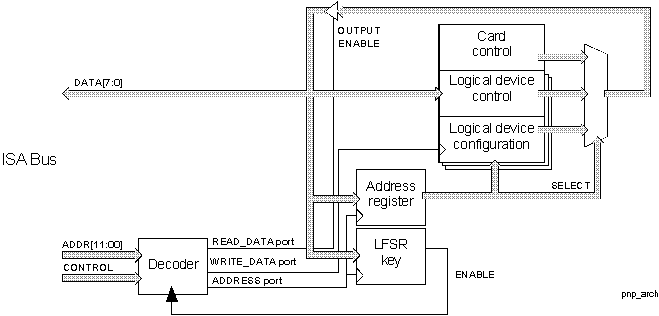| Port Name | Location | Type |
| ADDRESS | 0x0279 (Printer status port) | Write-only |
| WRITE_DATA | 0x0A79 (Printer status port + 0x0800) | Write-only |
| READ_DATA | Relocatable in range 0x0203 to 0x03FF | Read-only |
 Figure 3. Logic Flow for Auto-configuration
3.1.1. ADDRESS Port
The Plug and Play registers are accessed by first writing the address of the desired register to the ADDRESS port, followed by a read of data from the READ_DATA port or a write of data to the WRITE_DATA port. A write to the ADDRESS port may be followed by any number of WRITE_DATA or READ_DATA accesses to the same register location without the need to write to the ADDRESS port before each access.
The ADDRESS port is also the write destination of the initiation key, which is described later.
3.1.2. WRITE_DATA Port
The WRITE_DATA port is used to write information to the Plug and Play registers. The destination of the data is determined by the last setting of the ADDRESS port.
3.1.3. READ_DATA Port
The READ_DATA port is used to read information from the Plug and Play registers. The source of the data is determined by the last setting of the ADDRESS port.
The address of the READ_DATA port is set by writing the proper value to a Plug and Play control register. The isolation protocol verifies that the location selected for the READ_DATA port is free of conflict.
Figure 3. Logic Flow for Auto-configuration
3.1.1. ADDRESS Port
The Plug and Play registers are accessed by first writing the address of the desired register to the ADDRESS port, followed by a read of data from the READ_DATA port or a write of data to the WRITE_DATA port. A write to the ADDRESS port may be followed by any number of WRITE_DATA or READ_DATA accesses to the same register location without the need to write to the ADDRESS port before each access.
The ADDRESS port is also the write destination of the initiation key, which is described later.
3.1.2. WRITE_DATA Port
The WRITE_DATA port is used to write information to the Plug and Play registers. The destination of the data is determined by the last setting of the ADDRESS port.
3.1.3. READ_DATA Port
The READ_DATA port is used to read information from the Plug and Play registers. The source of the data is determined by the last setting of the ADDRESS port.
The address of the READ_DATA port is set by writing the proper value to a Plug and Play control register. The isolation protocol verifies that the location selected for the READ_DATA port is free of conflict.